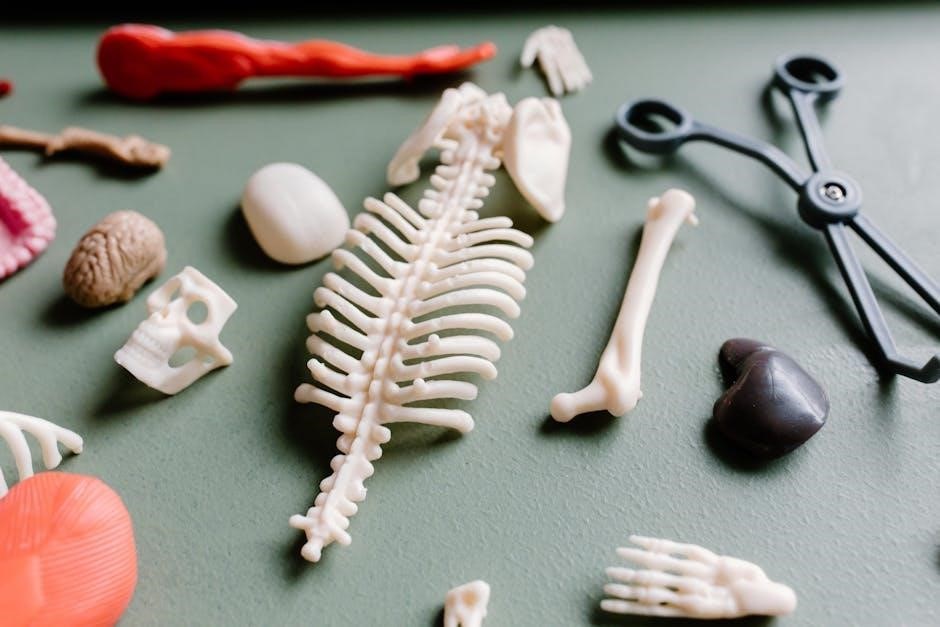Nursing study guides are essential tools that simplify complex topics, helping students master key concepts efficiently. They cover fundamental subjects like anatomy, pharmacology, and clinical skills, offering structured resources for success.
1.1 Importance of Study Guides in Nursing Education
Nursing study guides play a vital role in education by simplifying complex topics into organized, easy-to-understand resources. They cover essential areas like anatomy, pharmacology, and clinical skills, ensuring a strong foundation for future nurses. These guides are tailored to help students prepare for exams, including the NCLEX, by providing practice questions and case studies. They also offer practical insights for real-world scenarios, such as creating care plans and managing medications. Additionally, study guides promote active learning and stress management, which are critical for success in nursing school. Access to free PDF downloads, flashcards, and online tools further enhances their value, making them indispensable for both academic and professional growth.
1.2 Benefits of Using Nursing Study Guides
Nursing study guides offer numerous benefits, enhancing understanding and retention of complex medical concepts; They provide structured learning materials, such as flashcards and quick reference sheets, which aid in efficient exam preparation. These guides also include practice questions and case studies, helping students apply theoretical knowledge to real-world scenarios. Additionally, they promote time management and organization, essential skills for nursing professionals. Access to free PDF downloads and interactive online tools further enhances learning. By utilizing these resources, nursing students can build confidence, improve critical thinking, and develop practical skills necessary for patient care. These benefits collectively contribute to academic success and professional readiness.
1.3 How to Choose the Right Nursing Study Guide
Selecting the right nursing study guide involves considering your specific needs and learning style. Look for guides that align with your curriculum and cover key subjects such as anatomy, pharmacology, and clinical skills. Check for user reviews and recommendations from educators or peers to ensure the guide is reputable. Opt for resources that include practice questions, case studies, and interactive tools to enhance learning. Consider whether you prefer digital or printable formats, and ensure the content is updated with the latest medical knowledge. A well-chosen study guide can streamline your preparation, improve retention, and help you excel in nursing school and professional exams.

Key Subjects Covered in Nursing Study Guides
Nursing study guides cover essential topics like anatomy, pharmacology, and medical-surgical nursing, providing comprehensive resources for clinical skills, patient care, and exam preparation to ensure well-rounded knowledge.
2.1 Anatomy and Physiology
Anatomy and physiology are foundational subjects in nursing study guides, providing detailed insights into the human body’s structure and functions. These resources often include diagrams, charts, and practice questions to help nursing students understand complex biological processes. Topics range from the skeletal and muscular systems to the cardiovascular and nervous systems, ensuring a comprehensive understanding. Many guides offer free PDF downloads, such as the “Study of the Human Body 7th Edition PDF,” making learning accessible. Interactive tools, like flashcards and quizzes, reinforce retention. Mastering anatomy and physiology is crucial for nursing students, as it forms the basis for understanding pharmacology, medical-surgical nursing, and patient care.
2.2 Pharmacology and Medication Management
2.2 Pharmacology and Medicology Management
Pharmacology and medication management are critical areas in nursing study guides, focusing on understanding drug classes, dosages, and interactions. These resources often include detailed charts, side effect lists, and practice questions to reinforce learning. Many guides, such as those from Lecturio Nursing, provide free PDF downloads on pharmacology and dosage calculations. Topics cover drug administration routes, contraindications, and patient-specific considerations. Interactive tools, like flashcards and quick reference sheets, help students master complex medication regimens. These study aids are essential for preparing for exams and ensuring safe, effective patient care, making pharmacology a cornerstone of nursing education and practice.
2.3 Nursing Procedures and Skills
Nursing procedures and skills are foundational to patient care, and study guides dedicate extensive sections to mastering these competencies. Resources often include step-by-step guides for vital sign measurement, infection control protocols, and wound care techniques. Many study guides, such as the Ultimate Nursing Study Guide, provide detailed checklists and diagrams to reinforce hands-on skills. Topics like inserting IVs, administering medications, and using medical equipment are covered in-depth. Interactive tools, such as flashcards and video tutorials, complement traditional text, ensuring students can apply knowledge in clinical settings. These resources emphasize practical application, helping nurses build confidence and proficiency in delivering high-quality care.
2.4 Medical-Surgical Nursing
Medical-surgical nursing is a core area covered in study guides, focusing on adult health and surgical care. These resources provide detailed explanations of health assessments, medical conditions, and post-operative care. Topics include cardiovascular, respiratory, and gastrointestinal disorders, with an emphasis on evidence-based practices. Many guides, such as the Ultimate Nursing Study Guide, offer case studies and NCLEX-style questions to reinforce learning. Practical tools like medication charts and surgical procedure checklists are also included, helping students apply theoretical knowledge in real-world scenarios. These guides are indispensable for mastering the complexities of medical-surgical nursing, ensuring confident and competent patient care.
2.5 Pediatric and Geriatric Nursing
Pediatric and geriatric nursing study guides focus on the unique care needs of children and older adults. These resources cover growth and development milestones, age-specific health issues, and tailored nursing interventions. For pediatrics, topics include childhood illnesses, vaccination schedules, and developmental assessments. Geriatric sections emphasize chronic disease management, mobility issues, and end-of-life care. Many guides, such as the Ultimate Nursing Study Guide, provide case studies and practice questions to enhance understanding. Additionally, they address communication strategies for both age groups, ensuring holistic and compassionate care. These study tools are vital for nurses to deliver effective, age-appropriate patient care.

NCLEX Preparation Study Guides
NCLEX study guides offer exam-focused strategies and practice questions, covering essential topics like pharmacology, health assessments, and patient care scenarios to ensure success on the licensing exam.
3.1 Understanding the NCLEX Exam Format
The NCLEX exam is a computer-adaptive test assessing nursing knowledge and decision-making skills. It typically includes 75-265 questions, with a 6-hour time limit. The format varies, but most questions are multiple-choice, with some alternate formats like select-all-that-apply (SATA) or drag-and-drop items. The exam focuses on four main client needs: safe and effective care, health promotion, psychosocial integrity, and physiological integrity. Understanding the format helps candidates prepare effectively, emphasizing critical thinking and prioritization skills. Study guides often provide practice questions and strategies to master the exam’s unique structure, ensuring nurses are well-prepared for this pivotal licensing exam.
3.2 Effective Strategies for NCLEX Preparation
Effective NCLEX preparation involves a structured approach to studying. Utilize high-quality study guides and practice exams to familiarize yourself with the exam format. Prioritize content areas where you need improvement by reviewing detailed rationales for correct and incorrect answers; Active learning techniques, such as creating flashcards or concept maps, can reinforce key concepts. Allocate time for consistent practice, aiming to complete at least 50 questions daily. Incorporate time management strategies, such as the Pomodoro technique, to maintain focus. Additionally, join study groups or use online resources to discuss challenging topics. Regular self-assessment and adjustment of study plans are crucial for success.
3.3 Common NCLEX Practice Questions and Answers
NCLEX practice questions and answers are vital for exam preparation. They cover key topics such as medical-surgical nursing, pharmacology, and pediatric care. These resources often include rationales to enhance understanding. Many study guides provide free downloadable PDFs and interactive tools for convenience. Focus on high-yield areas like health assessments and medication management. Utilize flashcards and quick reference sheets for rapid review. Practice tests simulate exam conditions, helping you refine test-taking strategies. Regularly reviewing NCLEX-style questions improves critical thinking and time management skills, ensuring readiness for the actual exam. These resources are tailored to address common challenges and strengthen content mastery effectively.
3.4 Time Management Tips for NCLEX Success
Effective time management is crucial for NCLEX success. Create a structured study schedule, prioritizing high-yield topics like pharmacology and medical-surgical nursing. Allocate specific time blocks for practice questions and review. Minimize distractions by designating a quiet study space. Utilize flashcards and quick reference sheets for efficient review. Practice tests under timed conditions simulate exam pressures, enhancing your ability to manage time during the actual test. Stay consistent with your study plan and avoid cramming. Incorporate breaks to maintain focus and reduce burnout. By organizing your study time wisely, you can maximize productivity and achieve your goal of passing the NCLEX efficiently.

Nursing School Survival Tips
Master time management, use active learning techniques, and build a strong support network to thrive in nursing school. Stay organized and focused to succeed.
4.1 Creating a Study Schedule
Creating a structured study schedule is crucial for nursing students to manage their workload effectively. By organizing study sessions into manageable time blocks, students can ensure consistent review of all topics without feeling overwhelmed. A well-planned schedule allows for dedicated time to focus on challenging subjects, such as pharmacology or medical-surgical nursing, while also incorporating regular breaks to maintain focus and prevent burnout. Many nursing study guides recommend using a planner or digital calendar to outline daily and weekly goals, ensuring that all key areas are covered systematically. This approach helps students stay on track, retain information better, and perform well on exams.
4.2 Active Learning Techniques for Nursing Students
Active learning techniques are vital for nursing students to engage deeply with course material. Strategies like group discussions, case studies, and hands-on simulations encourage interaction and application of knowledge. Flashcards and quick reference sheets help reinforce key concepts, while practice questions and quizzes assess understanding. Many study guides recommend incorporating activities that mimic real-world scenarios, such as patient assessments or medication administration drills. These methods promote critical thinking and problem-solving skills, preparing students for clinical environments. By actively participating in their learning, nursing students can retain information more effectively and develop the practical skills needed for successful patient care.
4.3 Managing Stress During Nursing School
Managing stress during nursing school is crucial for academic and personal well-being. Techniques like deep breathing, meditation, and regular exercise can help reduce anxiety. Time management is key; creating a balanced schedule allows for study and relaxation. Connecting with peers or mentors can provide emotional support and share strategies for coping. Utilizing stress-management resources, such as guided relaxation apps or counseling services, can also be beneficial. Prioritizing self-care, including adequate sleep and nutrition, helps maintain energy and focus. By incorporating these practices, nursing students can navigate the demands of their program with resilience and confidence, ensuring their success and mental health.
4.4 Building a Support Network
Building a support network is vital for nursing students to thrive in their rigorous programs. Connecting with classmates fosters collaboration and shared knowledge, while mentors offer guidance and industry insights. Joining study groups enhances learning through peer discussion and mutual encouragement. Family and friends provide emotional backing, helping students stay motivated. Online communities and forums also serve as valuable resources for advice and camaraderie. Nursing schools often organize events to promote networking among students and faculty. Cultivating these relationships creates a strong foundation for academic success and professional growth, ensuring students feel supported throughout their journey.

Specialized Nursing Study Guides
Specialized guides cater to specific nursing fields like critical care, maternal health, mental health, and community nursing, providing in-depth knowledge tailored to each area of expertise.
5.1 Critical Care Nursing Study Guides
Critical care nursing study guides focus on life-saving interventions, hemodynamic monitoring, and advanced patient assessment. They cover complex topics like ventilator management, cardiac rhythms, and multi-organ support systems. These resources are designed for ICU nurses and students, offering practical insights and evidence-based practices. Many guides include case studies, algorithms, and drug dosage charts specific to critical care scenarios. They emphasize prioritization of care, ethical decision-making, and collaboration with interdisciplinary teams. By mastering these guides, nurses can enhance their ability to manage critically ill patients effectively, ensuring optimal outcomes and adherence to current clinical standards in high-stakes environments.
5.2 Maternal and Child Health Nursing Guides
Maternal and child health nursing guides focus on prenatal, postpartum, and pediatric care. They cover topics like fetal development, labor stages, breastfeeding, and newborn assessments. These resources also address common complications, such as gestational diabetes and preeclampsia, while emphasizing infant nutrition and immunization schedules. Guides often include case studies on high-risk pregnancies and child development milestones. They provide evidence-based practices for promoting healthy outcomes and managing conditions like congenital anomalies or childhood illnesses. Additionally, these guides highlight cultural sensitivity in caring for diverse populations. By using these tools, nurses can deliver comprehensive, compassionate care to mothers and children, ensuring optimal health across the lifespan.
5.3 Mental Health and Psychiatric Nursing Resources
Mental health and psychiatric nursing resources are designed to help nurses understand and manage various psychiatric conditions. These guides cover assessment techniques, therapeutic communication, and interventions for disorders like depression, anxiety, and psychosis. They also address crisis management, medication adherence, and legal-ethical considerations. Resources include case studies, practice questions, and evidence-based care plans, ensuring nurses are well-prepared to provide compassionate and effective care. These tools emphasize the importance of patient-centered approaches and cultural competence, enabling nurses to deliver high-quality mental health services. By utilizing these resources, nurses can enhance their skills in promoting mental well-being and supporting patients in their recovery journeys.
5.4 Community and Public Health Nursing Materials
Community and public health nursing materials focus on promoting health, preventing diseases, and improving population well-being. These resources cover epidemiology, health education, and disease prevention strategies. They often include manuals on conducting health assessments, developing health programs, and evaluating community interventions. Case studies and practical guides help nurses address health disparities, advocate for policies, and collaborate with diverse populations. Topics such as environmental health, infectious disease control, and health equity are emphasized. These materials equip nurses with the skills to implement evidence-based practices and lead community-focused initiatives effectively, ensuring they can make a meaningful impact on public health outcomes at a population level.

Digital and Printable Nursing Study Resources
Digital and printable nursing resources offer flexible learning options, including PDF guides, flashcards, and online tools, designed to simplify studying and enhance retention of key nursing concepts.
6.1 Free Nursing Study Guides and PDF Downloads
Free nursing study guides and PDF downloads are invaluable resources for students, offering accessible and cost-effective learning materials. These guides cover a wide range of topics, from anatomy and pharmacology to NCLEX preparation, ensuring comprehensive coverage of nursing essentials. Many resources include practice questions, case studies, and cheat sheets, helping students reinforce their understanding. Websites like Lecturio Nursing and Simple Nursing provide high-quality, downloadable content tailored to meet the needs of nursing students. These materials are often crafted by experienced educators, ensuring accuracy and relevance. By utilizing these free resources, students can save money while gaining organized, concise study tools to aid in their academic success.
6.2 Nursing Flashcards and Quick Reference Sheets
Nursing flashcards and quick reference sheets are popular study tools designed to enhance memorization and rapid recall of critical information. These resources often focus on high-yield topics such as pharmacology, lab values, and common medical conditions. Flashcards provide concise, bite-sized information, making them ideal for active learning and on-the-go review. Quick reference sheets summarize complex concepts into easy-to-digest formats, enabling students to grasp essential details quickly. Many flashcards and reference sheets are available digitally or in printable formats, offering flexibility for different learning styles. They are particularly useful for reinforcing key terms, medications, and clinical procedures, ensuring nursing students are well-prepared for exams and clinical practice.
6.3 Interactive Online Nursing Study Tools
Interactive online nursing study tools offer dynamic learning experiences that engage students beyond traditional textbooks. These tools include interactive modules, simulations, and adaptive learning platforms. They allow students to practice clinical scenarios, take quizzes, and receive instant feedback, enhancing their understanding of complex concepts. Many platforms incorporate gamification elements, making studying more enjoyable and effective. Some tools also provide personalized learning plans based on individual performance, helping students focus on areas where they need improvement. These resources are accessible on various devices, making them convenient for modern nursing students who prefer flexible and immersive study methods to excel in their education and professional development.
6.4 Mobile Apps for Nursing Students
Mobile apps for nursing students provide convenient access to study materials on-the-go, offering features like flashcards, practice questions, and interactive learning modules. Popular apps include those for pharmacology, dosage calculations, and NCLEX prep. Many apps offer offline access, allowing students to study anywhere. They often include searchable databases of medications, lab values, and clinical guidelines. Some apps also feature audio lectures and video tutorials, catering to different learning styles. These tools are particularly useful for busy nursing students who need to maximize their study time. By leveraging mobile technology, nursing students can stay organized, review key concepts, and prepare for exams effectively, ensuring academic success and clinical competence.

Enhancing Your Nursing Knowledge
Enhancing your nursing knowledge involves engaging with clinical case studies, evidence-based practices, and continuous learning opportunities. These resources help deepen understanding and improve patient care skills effectively.
7.1 Nursing Theories and Concepts
Nursing theories and concepts form the foundation of professional practice, guiding nurses in understanding patient care. These frameworks, such as Maslow’s Hierarchy of Needs and Jean Watson’s Caring Theory, provide structured approaches to addressing health challenges. Study guides often include detailed explanations of these theories, enabling students to apply them in real-world scenarios. By mastering these concepts, nurses can deliver holistic, patient-centered care. Resources like PDF downloads and flashcards simplify learning, ensuring nurses grasp key ideas for effective practice and exam preparation.
7.2 Clinical Case Studies and Scenarios
Clinical case studies and scenarios are vital components of nursing education, offering real-life examples that help students apply theoretical knowledge to practical situations. These tools, often found in study guides, present hypothetical or actual patient scenarios, allowing learners to develop critical thinking and problem-solving skills. Interactive case studies enable nurses to explore diverse conditions, diagnoses, and interventions, enhancing their ability to make informed decisions. Many resources, such as downloadable PDFs and online modules, provide detailed case analyses, fostering a deeper understanding of patient care. These exercises are invaluable for preparing students for clinical rotations and licensure exams like the NCLEX.
7.3 Evidence-Based Practice in Nursing
Evidence-based practice (EBP) in nursing integrates research findings, clinical expertise, and patient values to guide decision-making. Nursing study guides emphasize EBP by providing resources such as clinical guidelines, systematic reviews, and care protocols. These tools help nurses stay updated on best practices, improving patient outcomes and reducing variability in care. Many guides include case studies and scenarios that demonstrate how to apply EBP in real-world situations. By focusing on evidence-based interventions, nurses can deliver high-quality, standardized care. Study guides often highlight key EBP principles, making them accessible and actionable for students and professionals alike. This approach ensures nursing care is both effective and patient-centered.
7.4 Continuing Education for Nurses
Continuing education is vital for nurses to stay updated on advancements in healthcare. Nursing study guides play a crucial role in supporting lifelong learning by offering resources like free PDF downloads, webinars, and clinical updates. These materials often include evidence-based practices, case studies, and skill refreshers tailored to various nursing specialties. Many guides, such as the Hesi Fundamentals Study Guide, are designed to help nurses meet continuing education requirements while enhancing their clinical expertise. By leveraging these resources, nurses can maintain professional competence and deliver high-quality patient care. Continuing education ensures nurses remain adaptable to evolving healthcare demands and industry standards.



